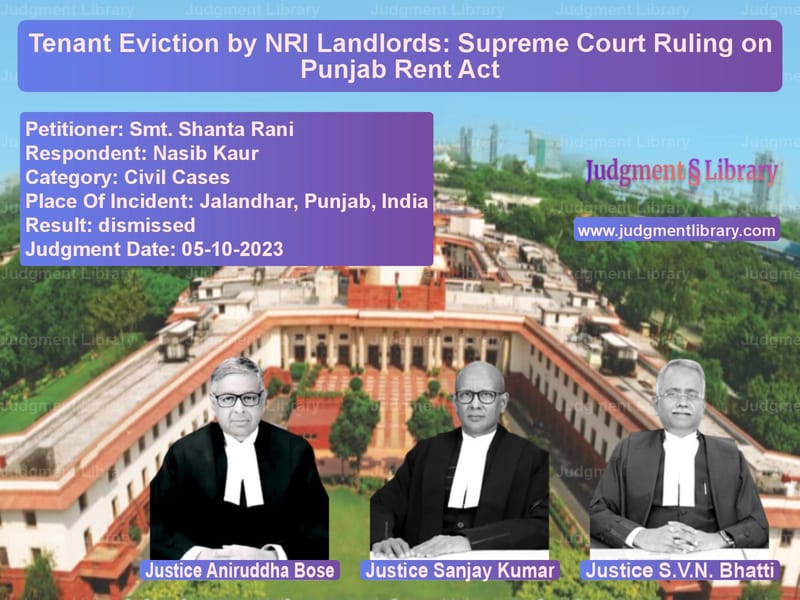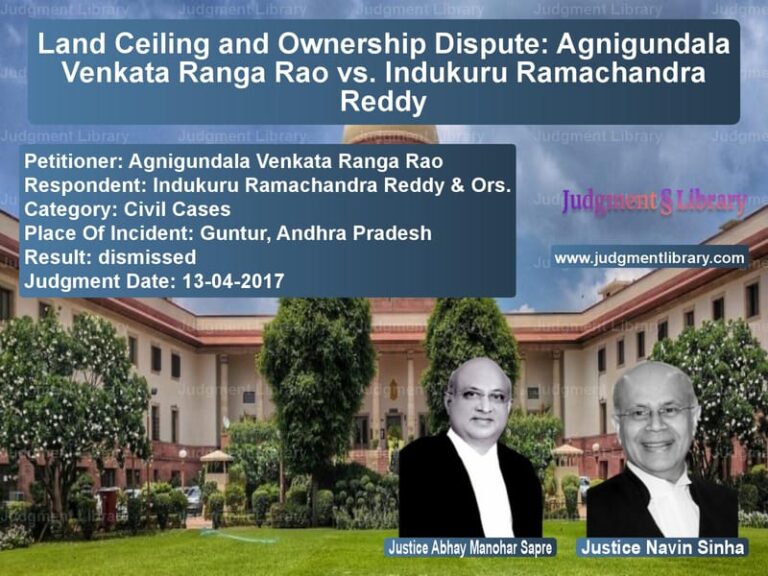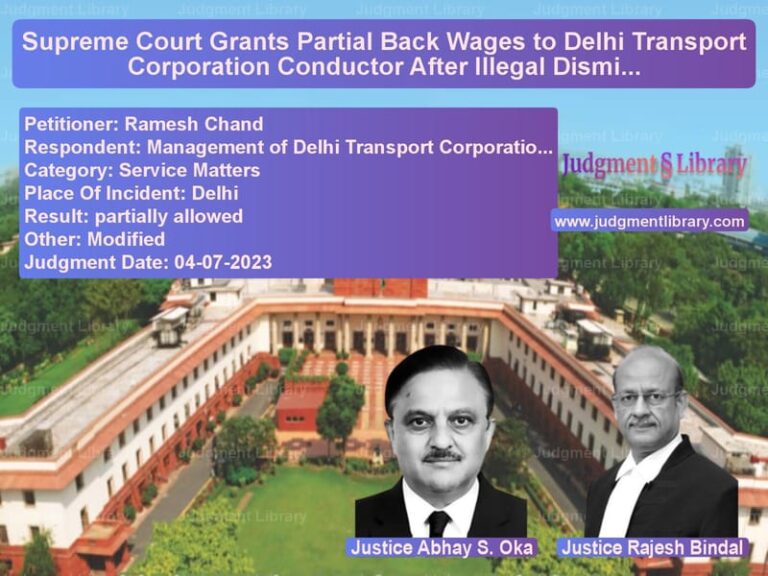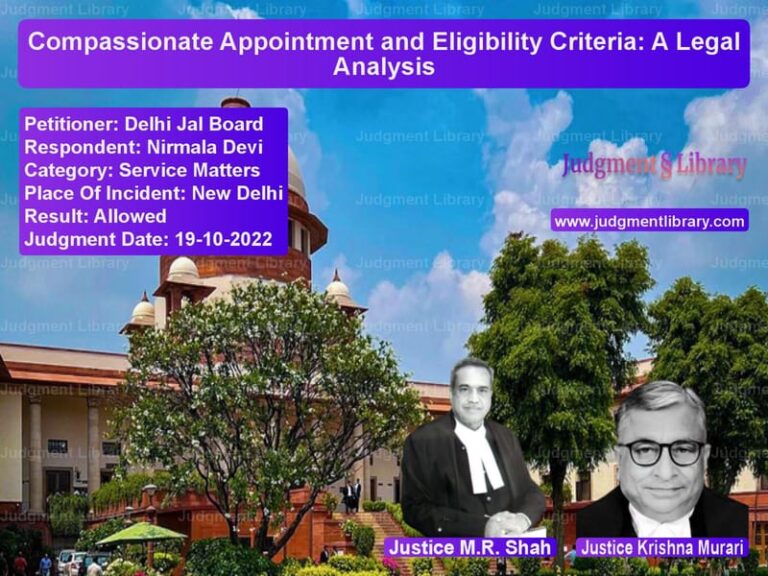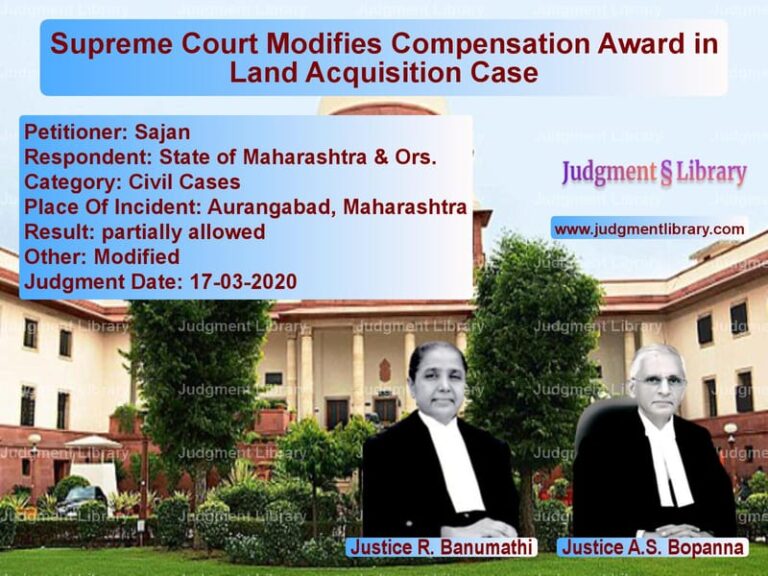Tenant Eviction by NRI Landlords: Supreme Court Ruling on Punjab Rent Act
The Supreme Court of India recently delivered a significant ruling in the case of Smt. Shanta Rani v. Nasib Kaur, clarifying the eviction rights of Non-Resident Indian (NRI) landlords under the East Punjab Urban Rent Restriction Act, 1949. The case centered on whether an NRI landlord can file an eviction petition under Section 13-B and whether a tenant’s plea to contest the eviction could be granted.
Background of the Case
The appellant, Smt. Shanta Rani, was a tenant occupying Shop Room No. 2 at Guru Amardas Chowk, Model Town, Jalandhar. The respondent, Smt. Nasib Kaur, was the landlady, who claimed to be an NRI residing in England and sought eviction under Section 13-B of the Act. The landlady argued that due to financial hardship and lack of work in England, she intended to relocate to India and establish a business in the tenanted premises.
The eviction petition was based on the following grounds:
- The landlady had no other property in Punjab in her possession.
- She required the premises for personal use to start a readymade garment business.
- The tenant had failed to vacate the premises despite repeated requests.
The Rent Controller ordered eviction, rejecting the tenant’s application for leave to defend. The Punjab and Haryana High Court upheld the decision, leading to the present appeal before the Supreme Court.
Legal Issues Raised
- Whether the eviction petition under Section 13-B was legally sustainable.
- Whether the landlady met the legal criteria for being considered an NRI.
- Whether the tenant had raised valid grounds to contest the eviction.
- Whether multiple eviction petitions for different shops in the same building impacted the validity of the present petition.
Arguments by the Appellant (Tenant – Smt. Shanta Rani)
- The landlady was a permanent resident of the United Kingdom and had not relocated to India, making the eviction petition under Section 13-B legally unsustainable.
- The eviction proceedings were mala fide and aimed at forcing the tenant out for commercial gain rather than genuine personal need.
- The landlady’s family had already obtained eviction of another shop in the same complex, which should bar her from filing another petition.
- The tenant had been lawfully occupying the premises for decades and should not be removed under a summary eviction process.
Arguments by the Respondent (Landlady – Smt. Nasib Kaur)
- The eviction petition was fully compliant with the provisions of the Rent Act.
- The landlady had submitted her passport as proof of NRI status.
- The fact that another eviction petition was filed for a different shop in the same building did not invalidate the present eviction request.
- The tenant failed to provide any substantial evidence that the eviction request was not bona fide.
Supreme Court’s Observations
The Supreme Court analyzed the provisions of Section 13-B and Section 18-A of the Rent Act, which govern summary eviction procedures. The Court made the following key observations:
- Section 13-B grants NRIs the right to recover possession of one property for their use.
- The landlady successfully proved her NRI status through her passport.
- The tenant’s plea that the landlady had already obtained eviction of another shop was irrelevant since separate owners within the same family could file independent petitions.
- The tenant’s objections were inconsistent—she denied the landlady’s ownership but also alleged that the landlady sought to sell the property.
- The Rent Controller had correctly rejected the tenant’s application for leave to defend as she did not present any substantial ground.
The Supreme Court also reaffirmed its previous rulings in Baldev Singh Bajwa v. Monish Saini (2005) 12 SCC 778 and Ram Krishan Grover v. Union of India (2020) 12 SCC 506, which held that:
“An NRI landlord is required to prove that: (i) he is an NRI; (ii) that he has returned to India permanently or for a temporary period; (iii) requirement of the accommodation by him or his dependent is genuine; and (iv) he is the owner of the property for the last five years before the institution of the proceedings for ejectment.”
Final Judgment
The Supreme Court dismissed the appeal and upheld the eviction order, stating that:
- The landlady met all requirements of Section 13-B.
- The tenant failed to establish any valid defense.
- The tenant’s objections were not supported by evidence.
- Eviction proceedings under Section 13-B are meant to facilitate NRIs in reclaiming property for personal use and should not be obstructed by frivolous defenses.
Implications of the Judgment
This ruling has significant implications for landlord-tenant disputes:
- Strengthens NRI landlord rights – NRIs can effectively reclaim their property under Section 13-B.
- Limits frivolous tenant defenses – Courts will dismiss baseless claims that aim to delay eviction.
- Clarifies summary eviction procedure – The judgment upholds the strict procedural safeguards of Section 18-A.
- Ensures fair application of rent laws – Landlords must comply with the mandatory five-year ownership requirement and can seek eviction only once in their lifetime.
The Supreme Court’s decision reinforces the principle that eviction laws should be interpreted fairly, ensuring both landlord rights and tenant protections within the legal framework.
Petitioner Name: Smt. Shanta Rani.Respondent Name: Nasib Kaur.Judgment By: Justice Aniruddha Bose, Justice Sanjay Kumar, Justice S.V.N. Bhatti.Place Of Incident: Jalandhar, Punjab, India.Judgment Date: 05-10-2023.
Don’t miss out on the full details! Download the complete judgment in PDF format below and gain valuable insights instantly!
Download Judgment: smt.-shanta-rani-vs-nasib-kaur-supreme-court-of-india-judgment-dated-05-10-2023.pdf
Directly Download Judgment: Directly download this Judgment
See all petitions in Landlord-Tenant Disputes
See all petitions in Property Disputes
See all petitions in Specific Performance
See all petitions in Judgment by Aniruddha Bose
See all petitions in Judgment by Sanjay Kumar
See all petitions in Judgment by S.V.N. Bhatti
See all petitions in dismissed
See all petitions in supreme court of India judgments October 2023
See all petitions in 2023 judgments
See all posts in Civil Cases Category
See all allowed petitions in Civil Cases Category
See all Dismissed petitions in Civil Cases Category
See all partially allowed petitions in Civil Cases Category

